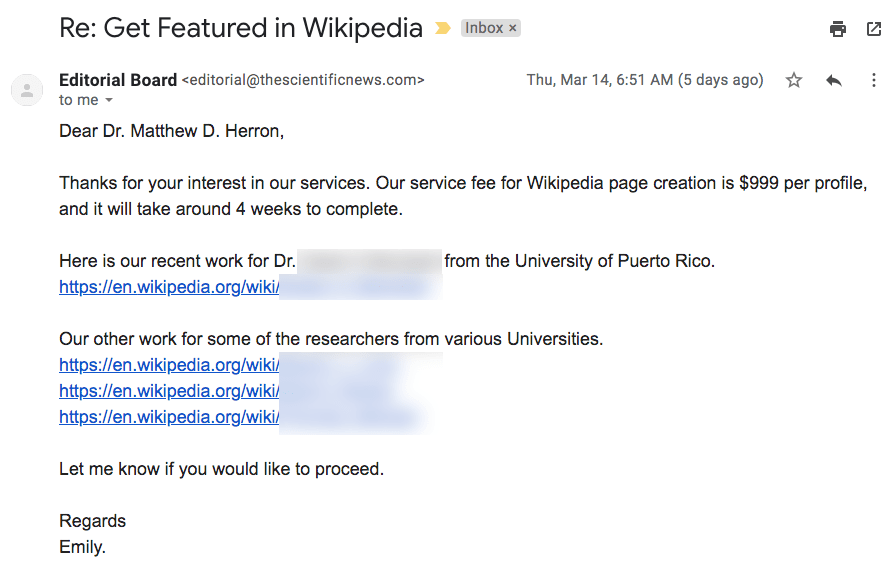It seems to be a universal rule: every ecosystem has its parasites. Wherever there is money being spent or media being consumed, people will find a way to exploit it. Thus we have Craigslist scammers, Amazon scammers, spammers on every platform, sellers of social media followers, predatory scientific journals, and sellers of dissertations, among many others. It seems there’s no ecosystem too small; even my academic website, which averages tens of views per week, gets a steady stream of spam comments:
So I shouldn’t have been surprised that there are people exploiting Wikipedia to make a buck:
There are few wikipedia editors who are willing to create a page for money, and most of them are scared to offer this service directly…
Maybe because it’s a violation to Wikipedia’s terms of use to make a paid contribution without disclosure? The whole thing seems sketchy to me to begin with, for the same reasons I find Research Features sketchy. This is self-promotion disguised as a work of reference. They are marketing to scientists’ egos (never a bad bet), offering to fake notability for a fee.
As I dug deeper, it only got sketchier. I replied to Emily/Betty that I’d like to see some examples of their work, which they provided along with a price and timeline:
I was able to find email addresses for three of the four subjects, so I emailed them. Two have so far replied that they have never heard of this company. If that’s true, we just went from sketchy to outright scam. I asked what information they would need from me:
Argh! Darn those unethical people who stop responding after the page is published!
I asked how I could pay, in response to which they sent me an invoice:
This is the first time they’ve shared the name of the company with me. “The Scientific News” isn’t a very informative search term, but “The Scientific News scam” turned up an interesting result. It turns out that Jerry Coyne has blogged about this company trying to sell other forms of publicity.
Unlike Research Features, which by all indications is honest about the (IMO sketchy) service they provide, The Scientific News appears to be doing something that is unambiguously unethical. If the scientists I contacted are telling the truth, The Scientific News did not actually write the pages they sent me as samples. Maybe they would actually write me a page after they had my money in hand; maybe not. The insistence on full payment up front does not inspire my confidence.
But even if we assume the scientists I contacted are lying (and I have no reason to think this is true), none of the pages they sent me as samples discloses that it was written for pay, a violation of Wikipedia’s policies.
Right now they’re waiting on me to send my CV (which they could easily find with a Google search). We’ll see if they follow up when I don’t respond. My money is on yes, since scammers can be awfully insistent when they catch the scent of a mark.
EDIT (2019-05-20): fixed a typo in which I inexplicably wrote “people exploiting Craigslist” instead of “people exploiting Wikipedia.”






Well an office on City Road* has to be funded some way!
* not a prime London location, but no office space in London is cheap.
It’s only a virtual office, which may I expect is no more than a mailbox. (£92.50 p.a., though I guess that is just for the use of the address, and you have to pay extra for them to actually handle mail for you.)